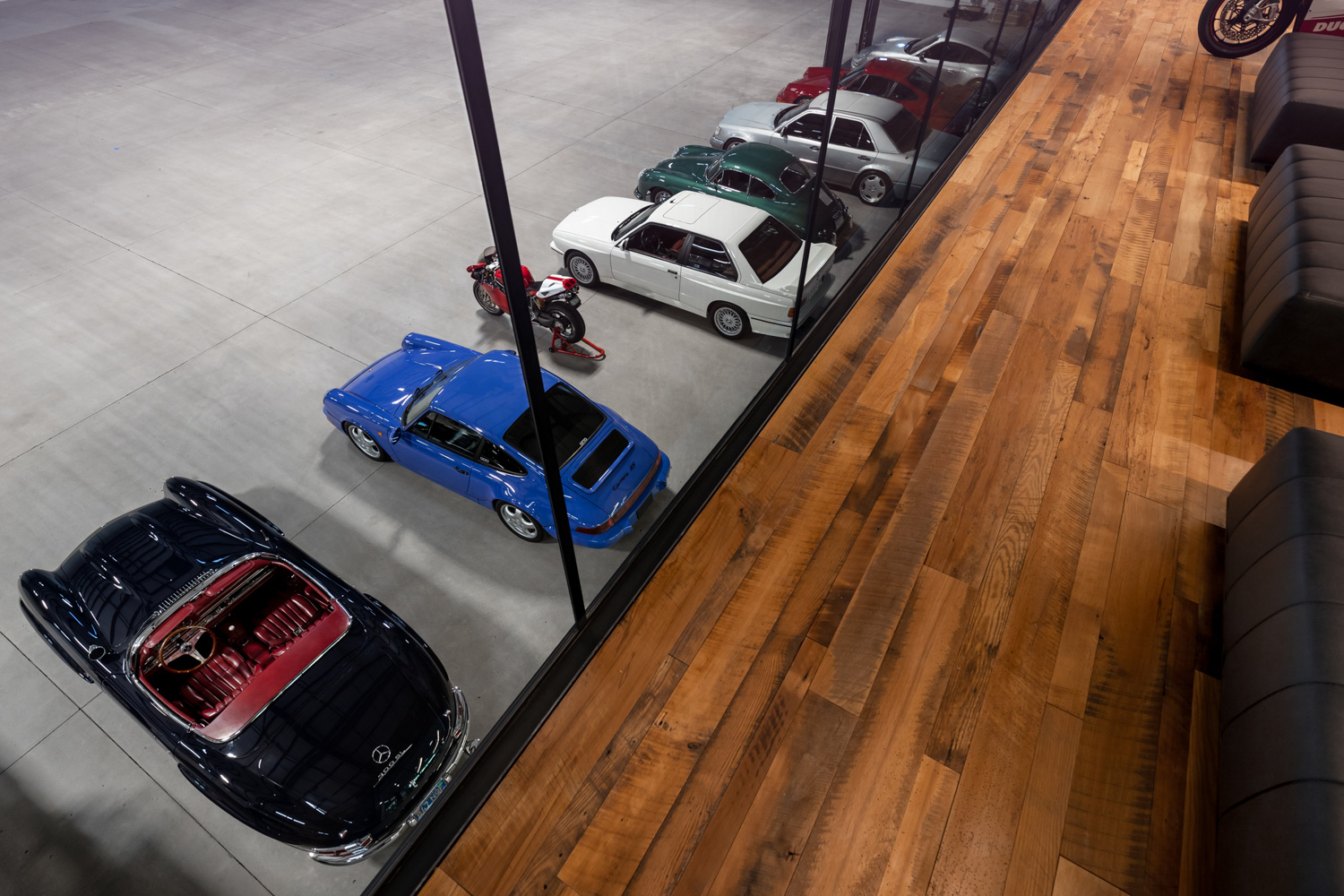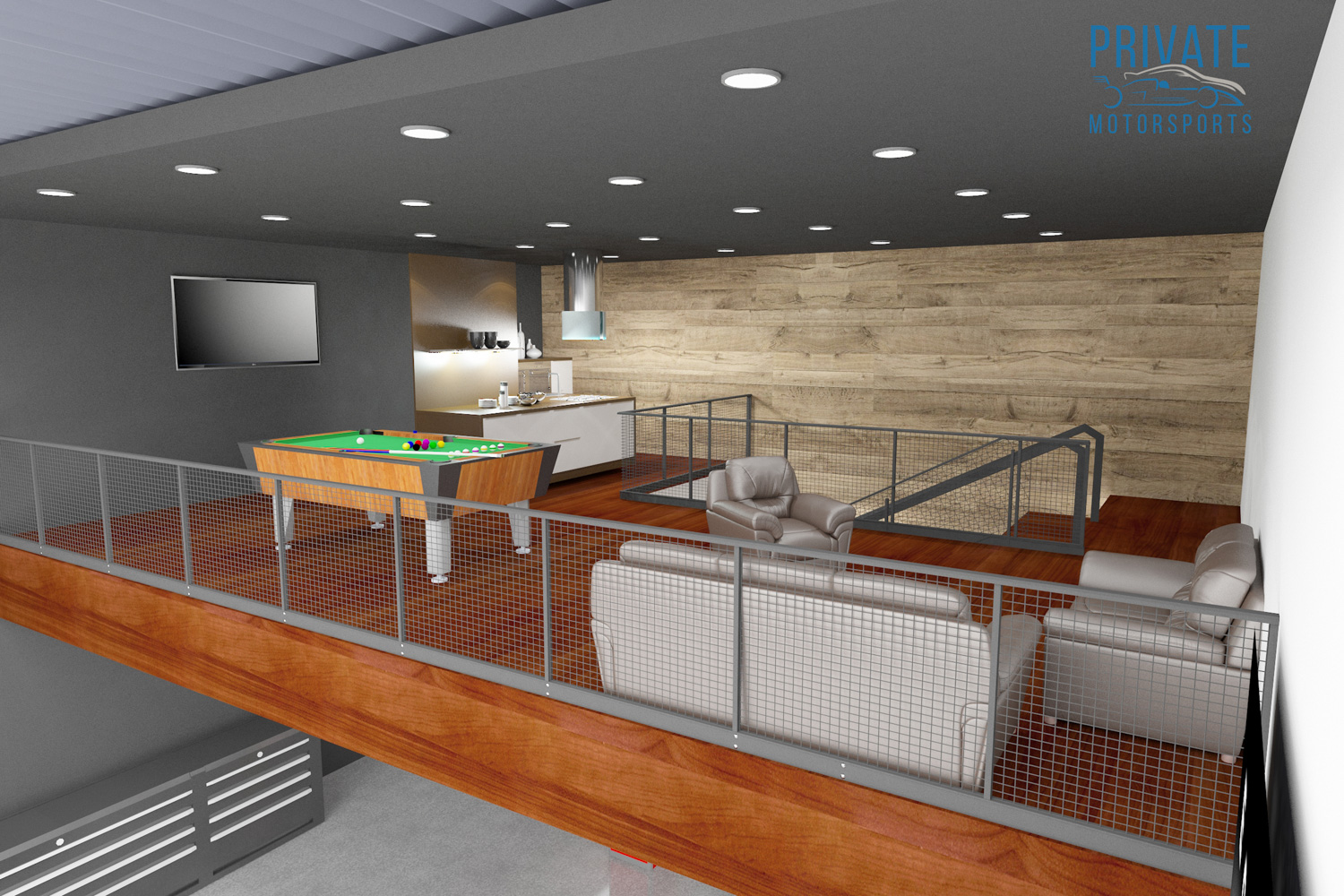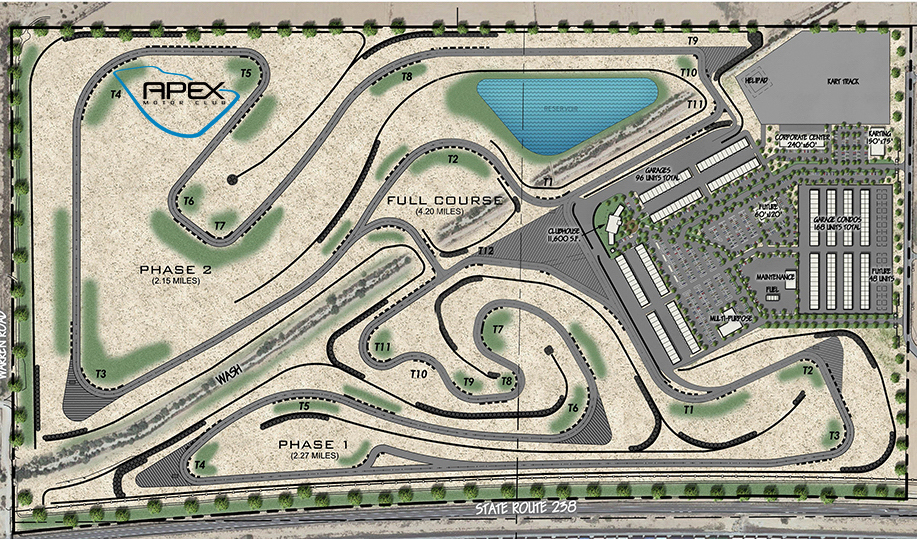How wealthy collectors store their cars when they need more space
Car collectors of every economic strata will readily confess that the rate-limiting step in their all-consuming hobby, the measure that puts the brakes on their acquisition of ever more vehicles, is not passion or even cost. It is space. Somewhere to store and maintain their vehicles, near enough to home that actually driving the cars remains a viable proposition, can be a challenge. This is true even for high-net-worth individuals, who share the same issues as the rest of us, just on a different scale. And for those of a certain means there are plenty of options when it comes to storing mechanical machinery, from simple climate-controlled buildings to lavish country-clubs.
“I think it comes down to the fact that the car market is still very strong, and people have limited space at home, regardless of how modest or lavish their home situation might be,” says Gordon McCall, a marketing and PR executive, and car collector, based in Northern California. “Here in the Monterey Peninsula, you’re really fortunate if you get a two-car garage when you buy a very pricey home. It’s difficult to gain permits for expansion—it’s expensive and tricky. So the demand is there, and the place to keep your stuff isn’t.”
McCall’s solution to this dilemma was to help found and develop the Monterey Motorsports Park, a car storage facility focused on the high-end collector. He is not alone. All over America, in locations where population, wealth, and automotive affection are concentrated, new car storage facilities are in the works.



There are several reasons why this is happening now. “One,” says Brad Phillips, Hagerty’s national relationship manager for private client services, “is that there is a lot of emphasis these days on having cars that are in a ready-to-use state.” A storage environment that is climate-controlled helps keep the cars in good running condition, and in locations with seasonal weather extremes, it prevents deleterious effects on hardware as well as cosmetic features like wood, leather, paint, and rubber.
“Second, people these days have taken the traditional car club mentality to the roads,” says Phillips. “They don’t want a monthly meeting in a bland restaurant.” Instead, enthusiasts want a gathering place, somewhere they can share stories with like-minded individuals while also using it as a locus for automotive-intensive or automotive-adjacent activities and experiences.
“Think of the amount of people that are considering downsizing their lives now that the kids are gone and they’re approaching retirement,” says Phillips. “Having a place like this to keep your car hobby going means you don’t have to tie up space at home for it.”
The car condo

These new storage developments are taking on varied forms. The first, like McCall’s is what we would call a “Car Condo.” These can take on different guises, but all of them share core similarities: they are not rental spaces, they are available for purchase and they can thus be decorated according to the owner’s personal tastes (or lack thereof.)
In Monterey Motorsports Park, these spaces are housed in four large buildings containing 90,000 square feet in total. Owners can purchase a subdivided private garage from 700 square feet to nearly 3000 square feet, at rates that McCall quotes as averaging around $360 per square foot. (This places the purchase price range from $250,000 to just over $1,000,000.) The median list price for homes in Monterey is $510 per square foot. Some owners with larger collections, or larger ambitions, are purchasing multiple spaces and combining them.
Location and proximity is key in marketing all of these spaces. “We’re literally ten minutes away from Laguna Seca Raceway and five minutes from the Monterey Airport,” McCall says, encouraging and allowing for ready utilization of owners’ vehicles. But the obvious benefit of purchasing garage space is no longer having to throw away money on rent. In addition to this, there are distinct tax advantages. “You can’t write your rent off,” McCall claims. “But you can certainly write off a legitimate business expense such as a real estate purchase.”
Though a top-tier local detailer has already purchased a garage space—a wise business investment amongst a captive clientele—McCall does not anticipate the site turning into an industrial park. The spaces have been zoned and permitted to allow the presence of car dealers, who can use the location as a retail establishment. A Morgan dealer in California is considering signing on as a buyer, and though the spaces are already 60-percent sold, McCall expects classic car and motorcycle purveyors to follow.
One thing that McCall will not be providing is much in the way of common space or amenities. “Everybody that I know already belongs to a club they’re comfortable with, if that’s their thing,” he says. “So we opted out of that club approach because the reality is, it’s space you end up paying for and not really using a lot.”
The car storage social club



Interestingly enough, this approach is a core appeal of the new “Open Warehouse” style OTTO Car Club near Scottsdale, Arizona. “The basic idea of OTTO is that we’re a mix between a social club for collectors and enthusiasts, and a collection management storage facility,” says 24-year-old founder and CEO Eli Kogan. “What really differentiates us is we are heavily focused on the social aspect of collecting and the automotive realm. I would actually say that we are first and foremost a social club, and storage is an amenity that we offer. ”
This means that, in addition to a 33,000 square-foot storage warehouse that holds 110 cars for ready use, 25 triple-tier stackers that hold 75 cars for more infrequent use, and 20 private two-car garages that hold 40 cars for 24-hour access, OTTO also has 8000 square feet of usable space for member events.
These can include onsite gatherings such as product introductions, dinner, lectures, movies, and whiskey tastings. (The club also hosts offsite events like rallies and track days.) So key is the clubhouse aspect to OTTO’s concept that it offers a purely social membership, at a cost of $5000 per year, to customers who are not even storing a car at the site. Car storage customers pay $8500 per year in dues, in addition to monthly fees ranging from $400 to $1000.
“When you’re into cars, if you’re not a racetrack kind of person, there’s really nowhere to congregate and experience the automotive realm with friends, family, or like-minded enthusiasts,” says Kogan. “We wanted to bring the Cars and Coffee atmosphere inside, and do it in an upscale, kind of private environment. Take away some of the hassle of the early mornings in a parking lot with shitty donuts.”
OTTO also provides heavy-duty collection management services including washing, detailing, track prep, and transport, on up through DMV registration, insurance brokering, and even international shipping (all for a fee). All of this can be coordinated and executed through an app, pegged to individual cars in an owner’s collection. The app even updates members on the OTTO’s upcoming events.
The club has been up and running since November of 2018, and is already halfway subscribed. Response has been so strong that Kogan is eyeing expansion. “The goal is to hit five to ten target cities in the U.S. and create a network in environments that are similar to Scottsdale, where there’s a car culture and a demographic of car wealth, but not necessarily many options for them to store and maintain their cars. To create a kind of trusted network around the country.”
The track country club



Kogan wouldn’t reveal his planned expansion locations, but nearby, in Maricopa, Arizona, Matt Williams and his partners are putting the finishing touches on the first phase of the Apex Motor Club, a private, “On-Track Storage Facility.”
Williams’ enterprise focuses on removing the pain points from track adventures. “We felt like if we could commoditize [track] driving so that it didn’t have to be a whole weekend, or three-and-a-half hours of trailering a car, we might have a hit on our hands,” Williams says. “One of the things we found to be important to people as far as making it convenient was storage.”
Two-car garages in phase one of the private club start at $295,000, and increase from there based on location—the 24 Formula 1-style units right in the hot pit of the initial two-mile track come at a significant premium. And this is before factoring in the cost of membership. These range from a $30,000 lifetime initiation fee plus $5000 in annual dues, which entitles a member to 200 days per year of track time, to a $75,000 initiation fee and $10,000 in annual dues, and comes with 275 days per year of track time.
In Phase Two, Williams plans include 48 more condos, another 2.25 miles of track, and an off-road course for four-wheel-drive vehicles, dirt bikes, and side-by-sides. And in Phase Three, the club will gain a 10,000 square-foot clubhouse with a pool, locker room, restaurant, and pro shop, as well as a karting facility. The club is also in conversation with OEMs to set up a long-term relationship, akin to what BMW has at The Thermal Club near Palm Springs, granting extended/exclusive rights to run press, corporate, and consumer driving programs on-site. “We have not had the chance yet to narrow that down to one,” Williams says. “But I feel pretty certain that we’ll have that done by the end of 2019.”
The open warehouse

Finally, in the purely utilitarian (but still decidedly upscale) portion of the parking market, is West Side Collector Car Storage, another “Open Warehouse” style facility. Founded by The Smoking Tire video/podcast host Matt Farah, the brand new, purpose-built facility near the airport and beach cities of Los Angeles, will be just 13,800 square feet when it is completed this summer, but offers room for 144 cars due to its plentiful quad-stacker lifts.
“I am building the place that I have wanted to be a customer of for a really long time,” says Farah. “Like, my life would really be a lot easier if a place like this just existed already and I could have given them money to keep my cars. But the truth is, that kind of place didn’t exist, so I just decided that I would be the one to build it.”
Because of zoning restrictions and building code regulations, Farah’s structure focuses almost solely on parking, at rates ranging from $850 to $1550 per month per car, depending on usage and number of vehicles stored. There will be a small members’ lounge, the building will host his new podcast studio, and members will be able to bring in their favorite detailer to take advantage of a dedicated wash bay. But Farah is decidedly not focusing on developing on-site programming or fostering a collective social milieu.
“I’m not anti-community. I would love to have, like, the baller-est place that would be like a Fast and Furious scene all the time, where people were just hanging out and it’s just the spot. But the fact of the matter is, I can’t afford that kind of real estate,” Farah says. “I don’t even have any parking on site. The irony of this did not escape me, but it is totally true. I can’t actually have any events because I have no parking.”








